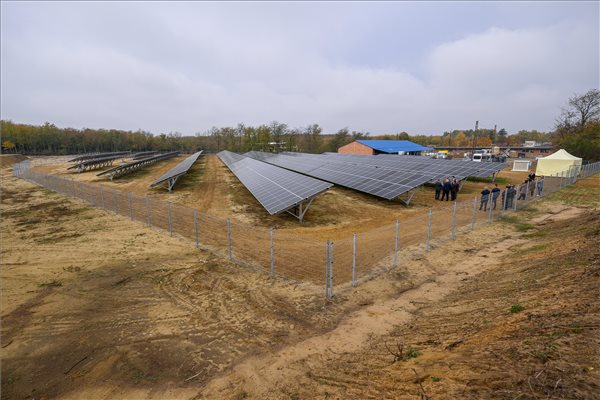A solar park was handed over at the brick site of Hajdu Hajdúsági Ipari Zrt. on Tuesday; the HUF 180 million investment was realized as part of a more than HUF 1.6 billion development, for which the government provided a total of almost HUF 780 million as part of the Large Enterprise Investment Support Program – the State Secretary of the Ministry of Finance responsible for public finance financing and international relations announced on the spot.
Tibor Tóth reminded that the government launched the support program for large companies in 2015: by the end of last year, around 250 companies had received more than HUF 200 billion in non-refundable support, and within the framework of the program, almost four thousand new jobs were created across the country.
The state secretary also spoke about how the bourgeois government laid the foundations of the Hungarian economy with a consistently implemented economic policy in the 2010s. Today, more than 4.7 million people are working, unemployment is at 3.4 percent and “by the time the crisis ends, we will be ready to give new impetus to the Hungarian economy again,” he said.
Tibor Tóth said that the war that broke out next door in February has now become the source of a global economic crisis as a result of the economic sanctions imposed by the West.
Therefore, he called the main immediate goal the mitigation of the harmful effects caused by the war and sanctioned inflation, the provision of energy supply, and the protection of jobs, i.e. the protection of the results achieved through many years of work.
He added that this is why the government decided to complete all started investments despite the war crisis: HUF 9,400 billion of public investment is currently underway, with which assistance being provided to small and medium-sized enterprises as well as large Hungarian companies.
Among the more distant goals, Tibor Tóth mentioned that “at the end of the war crisis, the positives weigh more in Latvia, just as it happened in the case of the epidemic in Hungary”.
“At the end of 2023, at the beginning of 2024, we can return to the balanced growth path, from 2024 we expect a GDP expansion of around 4 percent and a deficit of less than 3 percent,” added the state secretary.
Anna Dedéné Novotni, the vice president of the Hajdu group of companies, said: with their first solar park investment, they will stabilize their energy supply, reduce costs, and the use of green energy is also compatible with their production of products that use renewable energy.
Zoltán Kovács, managing director of Hajdu Infrastructure Kft., added: the first phase of the solar park produces 585,000 kilowatt-hours of electricity annually, which is 20 percent of the company’s electricity consumption. The investment will pay for itself in 1.6 years, he added.
MTI












